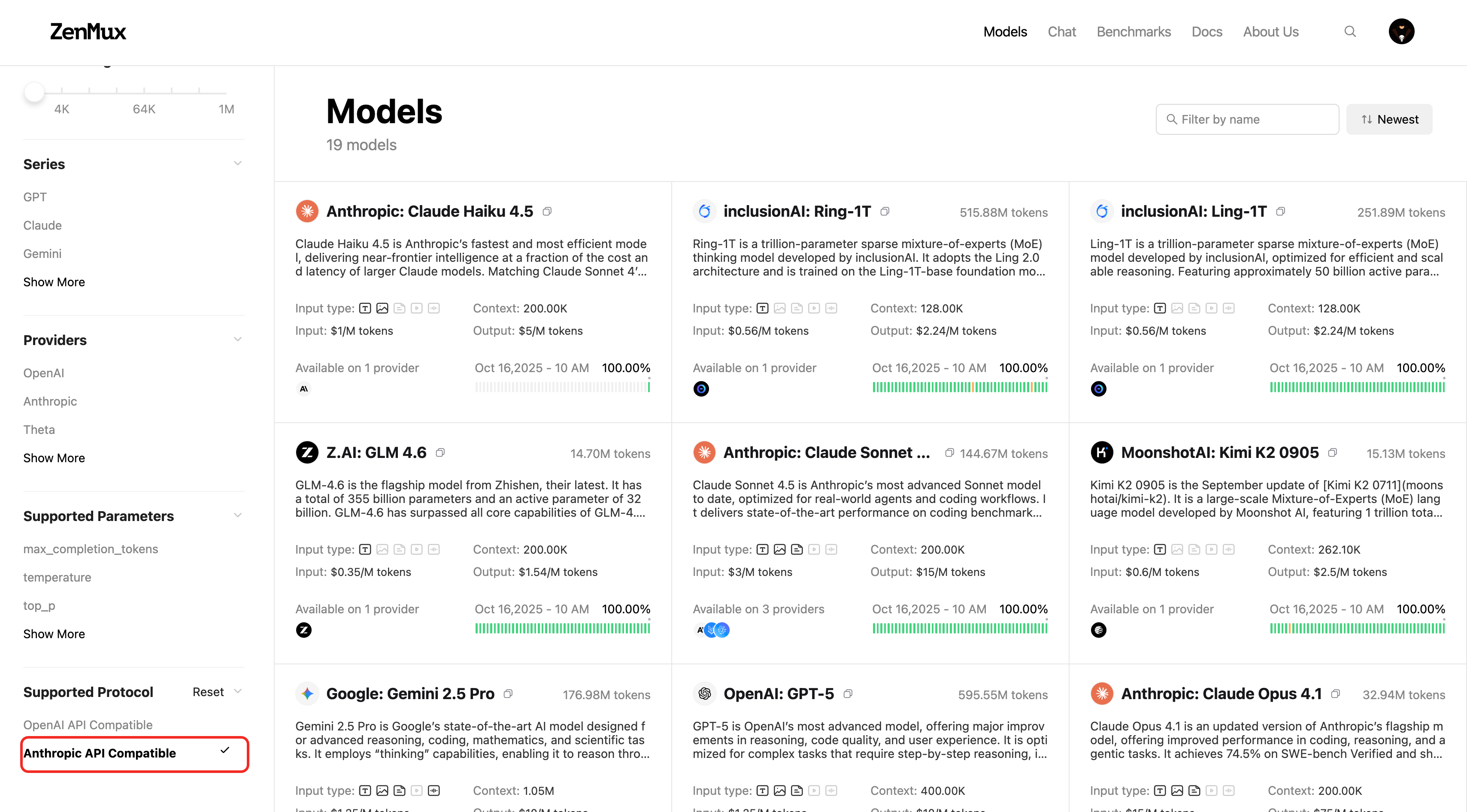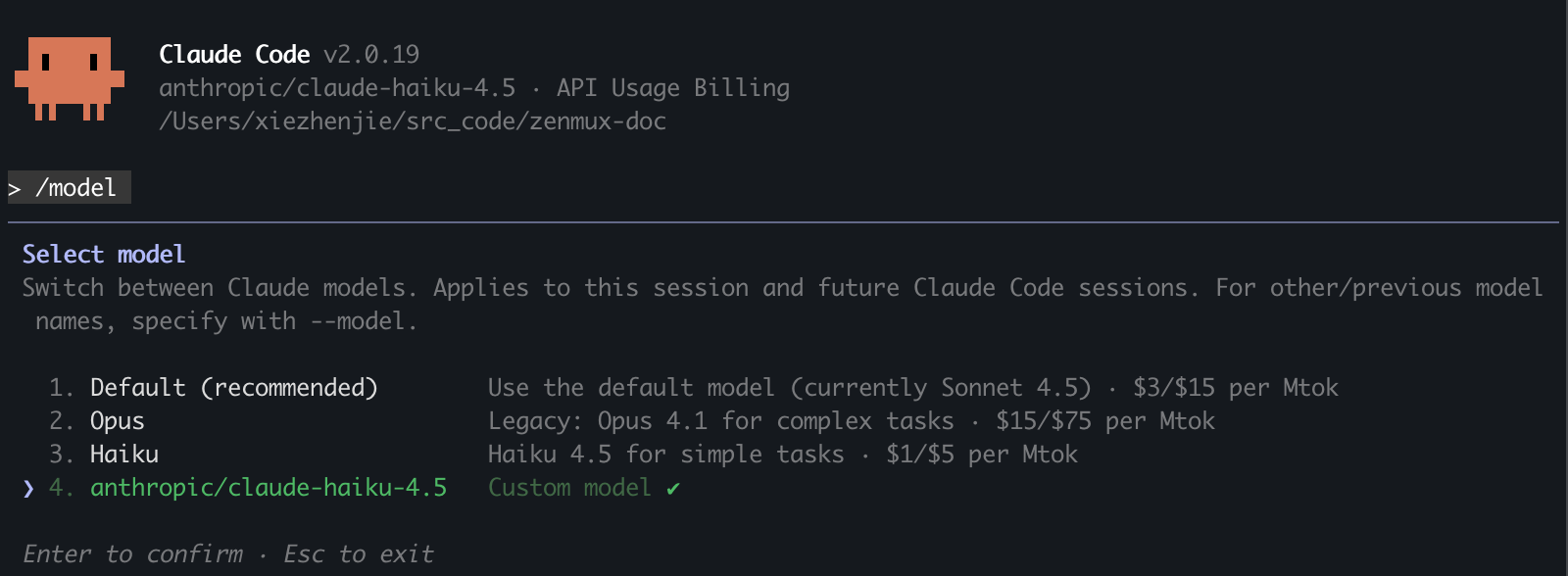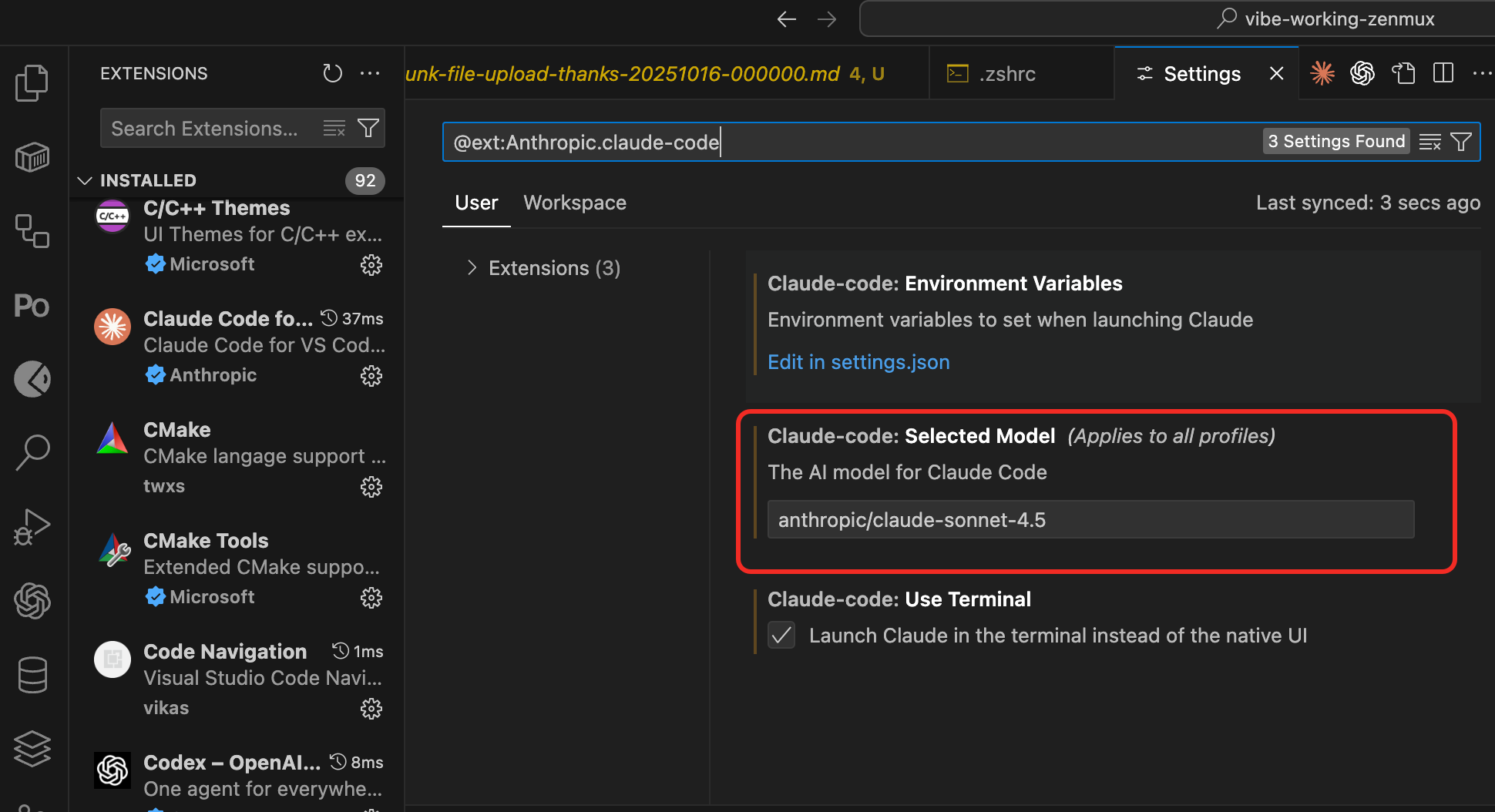Using Claude Code CLI with ZenMux: A Complete Guide
Compatibility Notes
Claude Code is Anthropic’s official coding agent. With ZenMux integration, you can use a wider range of models instead of being limited to Anthropic’s official Claude models.
For example, in Claude Code you can use models such as the GPT-5.2 series, Claude-4.5 series, Gemini-3 series, Grok 4.1 series, Doubao-Seed-Code, Kimi-K2, Minimax-M2, GLM-4.6, DeepSeek-V3.2, Qwen3-Coder-Plus, and more via ZenMux. For the full list of supported models, see the official model list.
ZenMux fully supports the Anthropic API protocol and can be seamlessly integrated into tools like Claude Code and Cursor. You only need to modify two parameters to use it.
Note: For the Anthropic protocol, use base_url="https://zenmux.ai/api/anthropic".
Configuration
Install Claude Code
Important Update: npm/pnpm Installation Is Deprecated
The npm/pnpm installation method for Claude Code has been deprecated and is no longer recommended. If you previously installed Claude Code via npm/pnpm, uninstall the old version first, then use the new native installation method.
Uninstall the old version (if applicable):
# Uninstall the npm/pnpm-installed version
npm uninstall -g @anthropic-ai/claude-code
# or
pnpm uninstall -g @anthropic-ai/claude-code
# If you already use the native installation, you can run the migration command directly
claude installRecommended installation (native install):
# One-line install script (recommended)
curl -fsSL https://claude.ai/install.sh | bash# PowerShell install script
irm https://claude.ai/install.ps1 | iex# CMD install script
curl -fsSL https://claude.ai/install.cmd -o install.cmd && install.cmd && del install.cmd# Install via Homebrew
brew install --cask claude-code
# Note: Homebrew installs do not auto-update; you must update manually
# Update command: brew upgrade claude-code# Install via WinGet
winget install Anthropic.ClaudeCode
# Note: WinGet installs do not auto-update; you must update manually
# Update command: winget upgrade Anthropic.ClaudeCode💡 Installation Notes
- Native install (recommended): The script-based installs for macOS/Linux/WSL and Windows auto-update, keeping you on the latest version.
- Package manager install: Homebrew and WinGet require running the update command manually to get new versions.
- Full installation docs: For detailed installation options, system requirements, authentication methods, and more, see the official Claude Code installation docs.
- Verify installation: After installation, you can run
claude doctorto check the installation status.
Configure Claude Code
How the Configuration Works
By default, Claude Code connects directly to Anthropic’s official service. By configuring environment variables, you can redirect its requests to ZenMux. Benefits include:
- No changes to Claude Code itself: Switch endpoints using only environment variables.
- Authenticate with a ZenMux API Key: Replaces Anthropic’s official API Key.
- Access more model choices: In addition to Claude models, you can use GPT, Gemini, Qwen, and more.
The core setup is to configure two key environment variables: ANTHROPIC_BASE_URL (the ZenMux service endpoint) and ANTHROPIC_AUTH_TOKEN (your ZenMux API Key). This makes all Claude Code requests route through ZenMux.
Important Change in v2.0.7x
Due to updates in Claude Code v2.0.7x, its environment variable loading logic has changed: the env configuration in ~/.claude/settings.json cannot be reliably read in the following scenarios:
- During the first login to Claude Code
- When logging in again after running logout
Therefore, when connecting to ZenMux, we recommend using shell profile environment variables for a consistent setup, ensuring both login and requests go through ZenMux’s Anthropic-compatible endpoint.
Step 0: Get a ZenMux API Key
Before configuring Claude Code, you need a ZenMux API Key. ZenMux offers two billing options—choose based on your use case:
✅ Best for: personal development, learning/exploration, Vibe Coding
✅ Features: fixed monthly fee, predictable cost, 5–10x price leverage
✅ API Key format: sk-ss-v1-xxx
How to get it:
1. Visit the subscription management page: https://zenmux.ai/platform/subscription
2. Choose a plan (Pro $20/month, Max $100/month, Ultra $200/month)
3. After subscribing, create a subscription API Key on the page
For details, see: Subscription Plan Guide
📚 https://docs.zenmux.ai/guide/subscription✅ Best for: production environments, commercial products, enterprise apps
✅ Features: no rate limits, production-grade stability, billed by actual usage
✅ API Key format: sk-ai-v1-xxx
How to get it:
1. Visit the pay-as-you-go page: https://zenmux.ai/platform/pay-as-you-go
2. Top up your account (top-ups automatically include a 20% bonus credit)
3. Create an API Key in the "Pay As You Go API Keys" section
For details, see: Pay-as-you-go Guide
📚 https://docs.zenmux.ai/guide/pay-as-you-go💡 Important: Choose the Correct API Key Type
- Personal development/learning → Use a Subscription API Key (
sk-ss-v1-xxx) for lower cost and better value. - Production/commercial projects → Use a Pay-as-you-go API Key (
sk-ai-v1-xxx) for higher stability and no limits.
Subscription keys are not allowed for production use. Violations may result in account restrictions.
Step 1: Configure Shell Environment Variables (Recommended)
This step writes the ZenMux connection settings into your shell configuration file, so they apply automatically every time you open a terminal.
# ============== Steps ==============
# 1. Determine which shell you are using (usually bash or zsh):
# - If bash, edit ~/.bashrc
# - If zsh, edit ~/.zshrc
# - If unsure, run echo $SHELL
# 2. Append the following to the end of the corresponding config file (replace the API Key)
# ============= ZenMux + Claude Code Configuration =============
# Point Claude Code to ZenMux instead of Anthropic’s official service
# Core config: ZenMux endpoint and authentication
export ANTHROPIC_BASE_URL="https://zenmux.ai/api/anthropic" # ZenMux Anthropic-compatible endpoint
export ANTHROPIC_AUTH_TOKEN="sk-ss-v1-xxx" # Replace with your ZenMux API Key (subscription sk-ss-v1-xxx or pay-as-you-go sk-ai-v1-xxx)
export CLAUDE_CODE_DISABLE_NONESSENTIAL_TRAFFIC="1" # Disable non-essential traffic
# Avoid conflicts: if you previously set ANTHROPIC_API_KEY locally, explicitly clear it
export ANTHROPIC_API_KEY=""
# Default model configuration (required): map the Haiku / Sonnet / Opus speed tiers to actual models
export ANTHROPIC_DEFAULT_HAIKU_MODEL="anthropic/claude-haiku-4.5" # Fast model
export ANTHROPIC_DEFAULT_SONNET_MODEL="anthropic/claude-sonnet-4.5" # Balanced model
export ANTHROPIC_DEFAULT_OPUS_MODEL="anthropic/claude-opus-4.5" # Powerful model
# 3. Apply the changes (choose one):
# Option 1: reload the config file (recommended)
source ~/.bashrc # if you use bash
# or
source ~/.zshrc # if you use zsh
# Option 2: restart the terminal window# ============== Steps ==============
# On Windows, use your PowerShell Profile to configure environment variables
# PowerShell 7+ is recommended for a better experience
# 1. Check whether the PowerShell Profile exists
Test-Path $PROFILE
# 2. If it returns False, create the Profile file
if (!(Test-Path $PROFILE)) {
New-Item -Path $PROFILE -ItemType File -Force
}
# 3. Open the Profile file for editing
notepad $PROFILE
# If you use VSCode, you can also use: code $PROFILE
# 4. Append the following to the end of the Profile file (replace the API Key)
# ============= ZenMux + Claude Code Configuration =============
# Point Claude Code to ZenMux instead of Anthropic’s official service
# Core config: ZenMux endpoint and authentication
$env:ANTHROPIC_BASE_URL = "https://zenmux.ai/api/anthropic" # ZenMux Anthropic-compatible endpoint
$env:ANTHROPIC_AUTH_TOKEN = "sk-ss-v1-xxx" # Replace with your ZenMux API Key (subscription sk-ss-v1-xxx or pay-as-you-go sk-ai-v1-xxx)
$env:CLAUDE_CODE_DISABLE_NONESSENTIAL_TRAFFIC = "1" # Disable non-essential traffic
# Avoid conflicts: if you previously set ANTHROPIC_API_KEY locally, explicitly clear it
$env:ANTHROPIC_API_KEY = ""
# Default model configuration (required): map the Haiku / Sonnet / Opus speed tiers to actual models
$env:ANTHROPIC_DEFAULT_HAIKU_MODEL = "anthropic/claude-haiku-4.5" # Fast model
$env:ANTHROPIC_DEFAULT_SONNET_MODEL = "anthropic/claude-sonnet-4.5" # Balanced model
$env:ANTHROPIC_DEFAULT_OPUS_MODEL = "anthropic/claude-opus-4.5" # Powerful model
# 5. Save the file, then restart PowerShell for the changes to take effect
# Or run: . $PROFILE
# 6. Verify that the environment variables are set correctly
Write-Host "ANTHROPIC_BASE_URL: $env:ANTHROPIC_BASE_URL"
Write-Host "ANTHROPIC_AUTH_TOKEN: $env:ANTHROPIC_AUTH_TOKEN"🔑 Important: Replace the API Key
Make sure you replace sk-ss-v1-xxx or sk-ai-v1-xxx in the config with your real ZenMux API Key:
Subscription API Key (recommended for personal development)
- Format:
sk-ss-v1-xxx - Where to get it: Subscription management page
- Detailed guide: Subscription plan docs
Pay-as-you-go API Key (for production)
- Format:
sk-ai-v1-xxx - Where to get it: Pay-as-you-go page
- Detailed guide: Pay-as-you-go docs
📋 Environment Variable Reference
| Variable | Purpose | Notes |
|---|---|---|
ANTHROPIC_BASE_URL | Service endpoint | Redirects Claude Code requests to ZenMux |
ANTHROPIC_AUTH_TOKEN | Auth token | Your ZenMux API Key (subscription or pay-as-you-go) |
CLAUDE_CODE_DISABLE_NONESSENTIAL_TRAFFIC | Traffic control | Disables non-essential telemetry to improve privacy |
ANTHROPIC_API_KEY | Conflict avoidance | Clear it to avoid conflicts with existing local Anthropic settings |
ANTHROPIC_DEFAULT_*_MODEL | Model mapping | Maps Haiku/Sonnet/Opus tiers to actual models |
Step 2: Launch Claude Code and Complete Authentication
After setting the environment variables, you can start Claude Code. On first launch, it will automatically authenticate via ZenMux.
Steps:
Open a new terminal window (to ensure the environment variables are loaded).
Go to your project directory:
bashcd /path/to/your/projectStart Claude Code:
bashclaudeOn first launch, Claude Code will:
- Automatically read
ANTHROPIC_AUTH_TOKENfrom the environment - Authenticate through the ZenMux endpoint specified by
ANTHROPIC_BASE_URL - Start working without any additional login steps
- Automatically read
Tip
If you see an error that the claude command cannot be found, confirm that Claude Code is installed globally (see the installation steps above).
Step 3: Verify the Connection
After you start successfully, it’s recommended to verify that Claude Code is connected to ZenMux.
At the Claude Code prompt, run /status and check whether the configuration is correct:
> /status
Auth token: ANTHROPIC_AUTH_TOKEN # [!code highlight]
Anthropic base URL: https://zenmux.ai/api/anthropic # [!code highlight]What to check:
- ✅
Auth tokenshould showANTHROPIC_AUTH_TOKEN(meaning it’s read from environment variables) - ✅
Anthropic base URLshould showhttps://zenmux.ai/api/anthropic(the ZenMux endpoint)
If the output matches the above, your setup is complete. You can now use Claude Code via ZenMux.
Change/Set the Default Model
You’ve already configured the default models in your shell profile (required). If you want to switch to other models, simply modify the same set of environment variables:
export ANTHROPIC_DEFAULT_HAIKU_MODEL="volcengine/doubao-seed-code"
export ANTHROPIC_DEFAULT_SONNET_MODEL="openai/gpt-5.2"
export ANTHROPIC_DEFAULT_OPUS_MODEL="google/gemini-3-pro-preview"After editing, remember to run source ~/.bashrc / source ~/.zshrc or restart your terminal for changes to take effect.
Supported Models
Anthropic Protocol Model Support Notes
Support for the Anthropic protocol is being rolled out in batches. You can filter currently supported models via the official model list by selecting the Anthropic Messages protocol:  You can also check support via a model’s detail page:
You can also check support via a model’s detail page: 
What It Looks Like
Once configured, you can use a variety of ZenMux models inside Claude Code:

You can use the /model command to confirm the model currently in use:

Troubleshooting
Common Issues and Fixes
API Key Error or Authentication Failure
Issue: You see an error indicating the API Key is invalid, unauthorized, or authentication failed
Solutions:
Check the API Key format:
- Subscription API Keys should start with
sk-ss-v1- - Pay-as-you-go API Keys should start with
sk-ai-v1- - Make sure there are no extra spaces or newlines
- Subscription API Keys should start with
Validate the API Key:
- Subscription: visit the Subscription management page to check subscription status and quotas
- Pay-as-you-go: visit the Pay-as-you-go page to ensure you have sufficient balance
Confirm the environment variables are loaded:
bash# macOS/Linux echo $ANTHROPIC_AUTH_TOKEN # Windows PowerShell echo $env:ANTHROPIC_AUTH_TOKENIf the output is empty, the environment variables were not loaded correctly. Run
source ~/.zshrcagain or restart the terminal.Check the API Key status:
- Confirm the API Key shows as "Enabled" in the console
- Check whether the API Key was deleted or disabled
Create a new API Key:
The Model Does Not Support the Anthropic Protocol
Issue: You see an error that a model does not support the Anthropic protocol
Solutions:
- In the ZenMux model list, filter by "Anthropic API Compatible" to view currently supported models
- Or open the model’s detail page to confirm whether it supports the Anthropic protocol
- Use a model from the supported list above
Connection Failure
Issue: Claude Code cannot connect to the ZenMux service
Solutions:
- Check that your network connection is working
- Verify
ANTHROPIC_BASE_URLis correctly set tohttps://zenmux.ai/api/anthropic - Ensure your firewall is not blocking outbound connections
VSCode Claude Code Extension Configuration
Issue: Problems occur in the VSCode Claude Code extension GUI mode
Solutions:
You can adjust Claude Code’s model configuration directly in the VSCode extension settings by changing it to the model slug specified in your config file. See the screenshots below:


Windows PowerShell Script Execution Policy
Issue: PowerShell shows: "Cannot load file xxx because running scripts is disabled on this system"
Solutions:
This is a Windows PowerShell security mechanism. You need to change the execution policy:
Run PowerShell as Administrator
Execute:
powershellSet-ExecutionPolicy -ExecutionPolicy RemoteSigned -Scope CurrentUserEnter
Yto confirmReopen the PowerShell window
Execution policy reference:
Restricted(default): no scripts are allowed to runRemoteSigned: local scripts can run; scripts downloaded from the internet require a digital signatureUnrestricted: all scripts can run (not recommended)
Windows: claude Command Not Found
Issue: After installing Claude Code, PowerShell reports it cannot find the claude command
Solutions:
This is usually because the npm global package path is not added to your PATH environment variable.
Check the npm global prefix:
powershellnpm config get prefixCheck whether that path is in PATH:
powershell$env:PATH -split ";" | Select-String "npm"If not, add it manually (choose one):
Option 1: Temporary (current session only)
powershell$env:PATH += ";C:\Users\<YourUsername>\AppData\Roaming\npm"Option 2: Permanent (recommended)
powershell[Environment]::SetEnvironmentVariable( "Path", [Environment]::GetEnvironmentVariable("Path", "User") + ";C:\Users\<YourUsername>\AppData\Roaming\npm", "User" )Close and reopen PowerShell
Verify installation:
powershellclaude --version
Windows: PowerShell Profile Not Taking Effect
Issue: You configured the PowerShell Profile, but the environment variables are not loaded
Solutions:
Confirm the Profile path:
powershell$PROFILE # It should look like: C:\Users\<YourUsername>\Documents\PowerShell\Microsoft.PowerShell_profile.ps1Confirm the Profile file exists:
powershellTest-Path $PROFILE # Should return TrueConfirm the file contents are correct:
powershellGet-Content $PROFILEManually load the Profile (to test for syntax errors):
powershell. $PROFILEIf errors occur, check:
- File encoding is UTF-8
- PowerShell syntax is correct (especially the
$env:prefix) - The execution policy allows scripts to run (see "PowerShell Script Execution Policy" above)
Verify environment variables are loaded:
powershellWrite-Host "ANTHROPIC_BASE_URL: $env:ANTHROPIC_BASE_URL" Write-Host "ANTHROPIC_AUTH_TOKEN: $env:ANTHROPIC_AUTH_TOKEN"
Windows: Garbled Chinese Characters in Environment Variables
Issue: Environment variables containing Chinese paths or values appear garbled
Solutions:
Ensure the PowerShell Profile file is saved with UTF-8 with BOM encoding
Set the correct encoding in PowerShell:
powershell[Console]::OutputEncoding = [System.Text.Encoding]::UTF8If the issue persists, avoid using Chinese characters in environment variable values
More Models
See the ZenMux model list for all available models and detailed information.
Contact Us
If you encounter any issues while using the service, or if you have suggestions or feedback, feel free to contact us via:
- Website: https://zenmux.ai
- Support Email: [email protected]
- Business Email: [email protected]
- Twitter: @ZenMuxAI
- Discord Community: http://discord.gg/vHZZzj84Bm
For more contact methods and details, please visit our Contact Us page.

